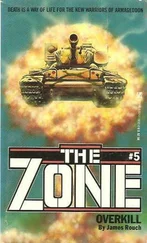‘What do you do with it?’
Baker looked somewhat sly. ‘I’m not allowed to tell you the specifics,’ he said, ‘but I can say that we work in conjunction with GCHQ and SIS doing data processing.’
‘OK,’ Richter said. He felt they had drifted somewhat from the matter at hand. ‘The Krutaya computer?’
‘Oh, yes,’ Baker said. ‘Follow me.’ He led the way through the main room and into a small office. It had a large desk, two upright chairs and a couple of armchairs. On the desk was another computer.
‘Is this a terminal attached to the Cray?’ Richter asked.
Baker looked slightly surprised. ‘No,’ he said. ‘This is a pretty standard PC – personal computer. You can buy one of these in Dixons. We can’t use the Cray for this job. We’re limited by hardware considerations, and I’ll explain that a bit later. We’re also restricted in what outside links we are allowed to make with the Cray, for security reasons. Any hostile intelligence service would just love to tap into the Cray’s data banks, which is why we’ve got it hard-wired to only three other computers.’
Richter could see why some people thought Baker was a computer nerd. ‘You mentioned outside links and hardware problems. Can you translate that into English for me?’
‘Certainly,’ Baker replied. ‘What this computer is doing is looking for another computer in Russia. The outside links are the telephone lines it’s using, and the hardware considerations are principally the speed of data transfer down those lines. The Cray is simply too fast and too powerful for this kind of work. The slowest part of the system is the telephone line. It’s designed to carry analogue signals – the human voice – not data.
‘The other problem is external noise,’ he went on, ‘the pops and crackles that you hear on most telephone lines. That can corrupt the data stream, which means that computers talk to each other using packets of data. Instead of sending an entire data file, the calling computer sends a packet of data and at the end of it a thing called a checksum. A checksum is a number that corresponds to the amount of data transmitted; the receiving computer adds up the units of data and calculates its own checksum. If that is the same as that sent by the first computer, it sends a message approving the transfer of the next data packet. If it isn’t, then it asks for the previous packet of data to be sent again. That’s the simplest method – there are a lot of much more sophisticated error-detecting protocols that can be used. All this, of course, is done by the computers – the operator is unaware that it’s going on at all, but you can see how it slows data transfer down, especially on noisy lines.’
That more or less made sense to Richter. He looked at the computer screen. The background was blue, and there were three headings in red across the top – ‘Code’, ‘Number’ and ‘Description’. White numbers were appearing in a vertical row below the ‘Code’ and ‘Number’ headings, about one every five to ten seconds, and immediately before the next number appeared, a line of text was generated under the ‘Description’ heading on the line above. ‘What’s it doing?’ Richter asked.
Baker sighed. ‘I’ve already explained that it’s looking for another computer in Russia.’
‘I know that. I meant how, exactly, is it doing that?’
‘Ah, that’s the clever bit.’
‘I was afraid it would be,’ Richter said, and sat down.
‘It’s running an auto-dialler program,’ Baker replied. ‘It’s trying every possible telephone number within the Komi district of Russia.’
‘That could take days,’ Richter said.
‘It’s been running for several hours – since about an hour after you talked to General Modin, in fact,’ Baker said. ‘Actually it’s not taking as long as I had calculated. The Komi district is pretty sparsely populated. A lot of it is swamp and the foothills of the Urals intrude to the east. About the only sizeable towns are Ukhta and Syktyvkar, and don’t forget that telephones in Russia – especially rural Russia, which is most of it – are still pretty rare, so a high proportion of the possible numbers don’t even exist.’
‘What does it do when a number answers?’
‘It listens,’ Baker said. ‘If it hears a voice, the computer breaks the connection and dials the next number in the sequence. If nobody answers after twenty seconds, or if it hears a fax tone – rarer still in Komi – it breaks the connection, but if it detects a modem, it logs the number for future action, and then breaks the connection.’
Light was slowly dawning. ‘Isn’t it a risk,’ Richter asked, ‘using a computer based here at FOE?’
Baker smiled happily. ‘I was hoping you’d ask that, because it means you’ve been listening to what I’ve been saying. The answer is yes, it would be, if we were using this computer.’
‘You’ve lost me again.’
‘That’s the really clever bit. What I’ve done is establish communications with a computer in our Embassy in Moscow – not in the Holy of Holies, of course. That computer in Moscow,’ Baker went on, ‘is actually making the calls. If anyone runs a back-trace down the line, Moscow is where the trail will stop.’ A bell rang somewhere, and Baker excused himself to answer it. He returned pushing a small trolley covered with the files Richter had ordered from the Registry. He had requested all the files FOE held having any connection with the Komi district, personnel files on known senior officers in the SVR and GRU, including Bykov and Modin, and on previous KGB and GRU operations. According to Baker, popular passwords in the Royal Navy include famous naval victories, like Trafalgar and Taranto, and Russian officers might well feel the same about past triumphs.
What appalled Richter was the size of the pile, but he sat down and started working his way through it.
Kutuzovskij prospekt, Moscow
The two cars parked directly outside the apartment building and seven men got out. They stood for a few moments in a group on the pavement, then entered the building together.
Genady Arkenko hadn’t seen them arrive, but he heard them outside the apartment, just before they kicked down the door. His last act as a faithful friend and devoted lover of Dmitri Trushenko was to press the speed-dial code for Trushenko’s mobile number and leave the phone off the hook and out of sight. That way, Arkenko hoped, Trushenko would hear what happened.
Hammersmith, London
Four minutes later, the computer emitted a single peremptory ‘beep’ and the numbers stopped appearing. Baker put down his mug of coffee and sat in front of the screen. ‘Let’s see what we’ve got.’ He pressed a couple of keys and the screen display changed. The legend ‘Autodial Record’ appeared at the top, and under it the headings ‘Number’ and ‘Identification if known’. There were fifteen numbers listed.
‘Only fifteen?’ Richter asked.
‘It’s about what I expected,’ Baker said, and pointed at the right-hand column. ‘Eight of these numbers have already been identified by the computer as belonging to the LPAR site at Pechora. As soon as a modem tone is detected, a sub-routine on the program accesses a database of known numbers and attempts a match. If it finds one, it displays the identification.’
‘So there are seven unknown computers in the area?’
‘Possibly,’ said Baker. ‘If you look at the numbers, we can probably eliminate one, because it’s only two digits different from one of the known numbers at Pechora. I think we’ve only got six to try.’ He pressed a key and the list appeared on a sheet of paper in the output tray of the laser printer sitting next to the computer.
Читать дальше












